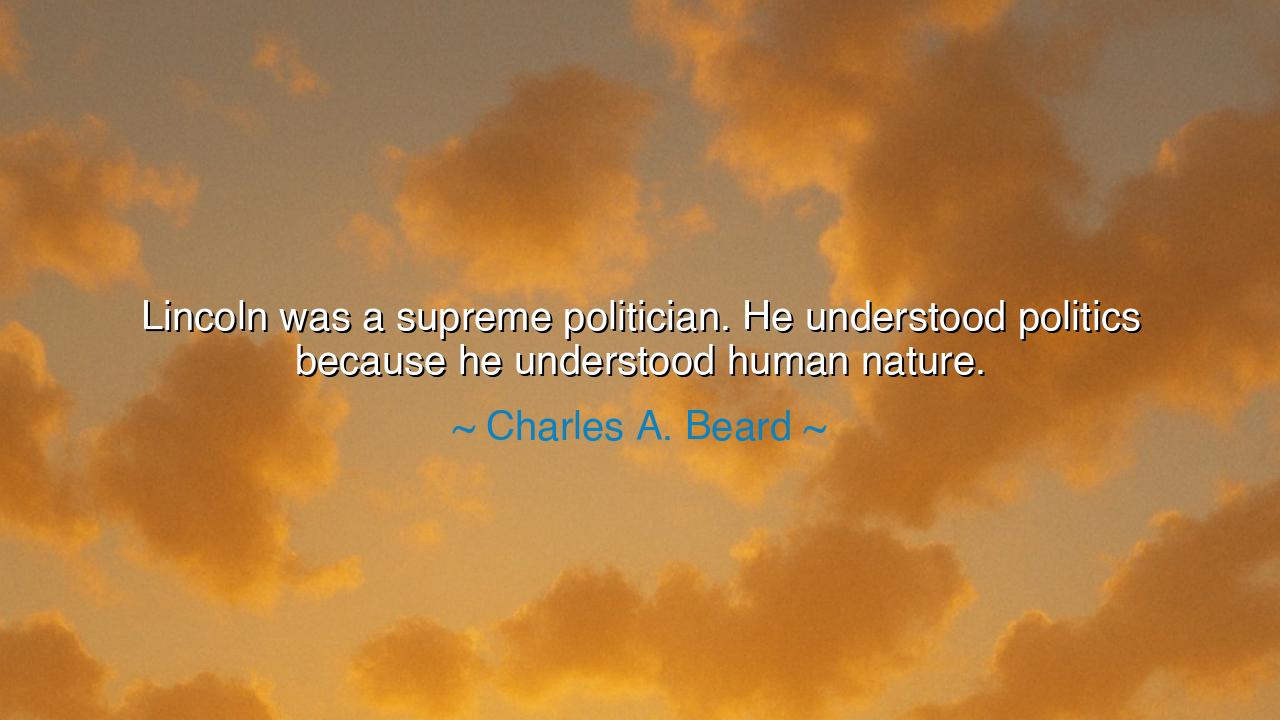
Lincoln was a supreme politician. He understood politics because
Lincoln was a supreme politician. He understood politics because he understood human nature.






Abraham Lincoln was not merely a leader of men, but a master of the deepest currents that move the human spirit. When Charles A. Beard declared, “Lincoln was a supreme politician. He understood politics because he understood human nature,” he unveiled the secret at the heart of true leadership. Politics is not only about laws and policies; it is about people—their fears, their hopes, their pride, and their pain. The one who understands human nature holds the key to uniting divided hearts and guiding nations through turmoil.
Lincoln’s greatness lay in his profound empathy. Born in humble circumstances, he knew the struggles of common folk, and this gave him insight into the desires and weaknesses of others. His words were not mere rhetoric; they flowed from a deep well of understanding. This is why, even amidst the Civil War, he could speak to both the North and South with compassion. His famous Second Inaugural Address, calling for “malice toward none, with charity for all,” revealed his mastery of the human heart, showing that victory must come not through domination, but through reconciliation.
A striking example of Lincoln’s political mastery was his handling of his own cabinet, famously called a “team of rivals.” Many of these men had been his political opponents, each with their own ambitions and egos. Lesser leaders would have been consumed by infighting, but Lincoln, with keen insight into human nature, balanced their desires and guided them toward a common goal: the preservation of the Union. His ability to read men’s motives and speak to their better angels made him not just a president, but a unifier.
History offers many rulers who lacked this understanding. Brilliant strategists and lawmakers have fallen because they failed to grasp the hearts of the people they governed. Napoleon Bonaparte, though a military genius, could not sustain his empire because he treated men as pieces on a chessboard, not as living souls with dreams and grievances. Lincoln’s enduring legacy stands in contrast: he saw beyond power and strategy to the very essence of human beings.
To understand politics, one must first understand human nature. Laws may bind actions, but it is the unseen forces of emotion, belief, and desire that truly move societies. Lincoln’s gift was to speak to these forces, shaping them with wisdom rather than coercion. This is why he is remembered not only as a leader in war, but as a healer of the human spirit.
Let future generations take heed of this teaching: greatness in politics is not achieved through cunning alone, but through empathy and insight. The leader who sees deeply into the hearts of others wields a power greater than armies or wealth—the power to inspire unity. Lincoln’s life stands as a testament that the highest art of politics is, and always will be, the understanding of human nature.






PTHong Tham Pham thi
One concern: we risk turning a statesman into a saint and learning the wrong lessons. How do we parse myth from method? I’d appreciate a historiography-aware approach: weigh private letters against public rhetoric, compare allies’ and adversaries’ accounts, and map how later biographers project their era’s anxieties onto the past. Could you suggest a reading path that contrasts complementary portraits—strategist, moral reasoner, opportunist—so we gain transferable skills rather than hagiography? I want tools, not incense.
HYTran Hai Yen
From a behavioral lens, reading human nature means respecting loss aversion, identity protection, and status threat. How can policy design metabolize those realities instead of denying them? I’m imagining defaults that preserve dignity, opt-ins framed as stewardship rather than shame, and pilot programs that let opponents save face while data accrues. Could you propose a short checklist for drafting reforms that anticipate backlash—message testing across identities, exit ramps for skeptics, and symbolic acts that honor belonging while change unfolds?
DDucAnhMatAcc
There’s an ethical knot around means and ends. Pragmatism can advance justice—or dilute it to the point of drift. How should a leader decide when to bargain and when to draw a bright line? I’d love a decision matrix: urgency of harm, reversibility of compromise, coalition durability, and downstream precedent. Include guardrails for not overselling incremental steps as moral completion. Also, what signals show the window has shifted enough to escalate from half-measures to full commitments without shattering legitimacy?
NTKim Phuong Nguyen Thi
I’m thinking about language as technology. The most durable phrases frame conflict as a shared project, not a personal feud. What structural elements made certain addresses resonate—plain diction, moral metaphors, acknowledgments of grief, and invitations to a future self people want to inhabit? Could you outline a template for high-stakes messaging: name the wound, widen the “we,” define an achievable horizon, assign agency, then bless the listener’s better self? A couple of modern, nonpartisan examples would help stress-test the pattern.
ATAnh Thi
The coalition question nags me. Managing rivals, wounded egos, and competing moral vocabularies seems like the real craft. What routines help a leader transform antagonists into contributors—private respect, public credit, clear lanes of authority? If I’m running a diverse team, how would I adapt those moves: a rotating “devil’s advocate,” memoed decision criteria, and ritualized praise for dissent that improves outcomes? I’d appreciate a playbook for keeping big tents functional without becoming shapeless or hostage to the loudest faction.